Crossref Citations
This article has been cited by the following publications. This list is generated based on data provided by Crossref.
Mejer, Jan
1993.
Les Evénements de Mai-Juin 1968 as a Modernity Crisis.
Theory, Culture & Society,
Vol. 10,
Issue. 1,
p.
53.
Tiryakian, Edward A.
1994.
Revisiting sociology's first classic:The division of labor in society and its actuality.
Sociological Forum,
Vol. 9,
Issue. 1,
p.
3.
1994.
Bibliography.
Current Sociology,
Vol. 42,
Issue. 1,
p.
129.
Tiryakian, Edward A.
1995.
COLLECTIVE EFFERVESCENCE, SOCIAL CHANGE AND CHARISMA: DURKHEIM, WEBER AND 1989.
International Sociology,
Vol. 10,
Issue. 3,
p.
269.
Tiryakian, Edward A.
2000.
Parsons's Emergent Durkheims.
Sociological Theory,
Vol. 18,
Issue. 1,
p.
60.
Terrier, Jean
2012.
„Auch in unserer Zeit werden Götter in den Massen geboren“. Emile Durkheims Erklärungsansätze zur Entstehung gesellschaftlicher Ideale in der Moderne.
Berliner Journal für Soziologie,
Vol. 22,
Issue. 4,
p.
497.
Santiago, Jose
2012.
Secularisation and Nationalism: A Critical Review.
Social Compass,
Vol. 59,
Issue. 1,
p.
3.
Joas, Hans
2013.
Durkheim et l’extase collective.
Trivium,
Hirst, Benjamin Adam
2014.
After Lévinas.
European Journal of Social Theory,
Vol. 17,
Issue. 2,
p.
184.
Tiryakian, Edward A.
2017.
Les Formes Élémentaires de la vie religieuse: passado, presente e futuro.
Sociologias,
Vol. 19,
Issue. 44,
p.
38.
Müller, Hans-Peter
2019.
Das soziologische Genie und sein solides Handwerk.
p.
241.
Bolton, Derek
2023.
The unbearable lightness of being? Reconfiguring the moral underpinnings and sources of ontological security.
International Theory,
Vol. 15,
Issue. 2,
p.
234.
Gissis, Snait B.
2024.
Lamarckism and the Emergence of 'Scientific' Social Sciences in Nineteenth-Century Britain and France.
Vol. 36,
Issue. ,
p.
185.



